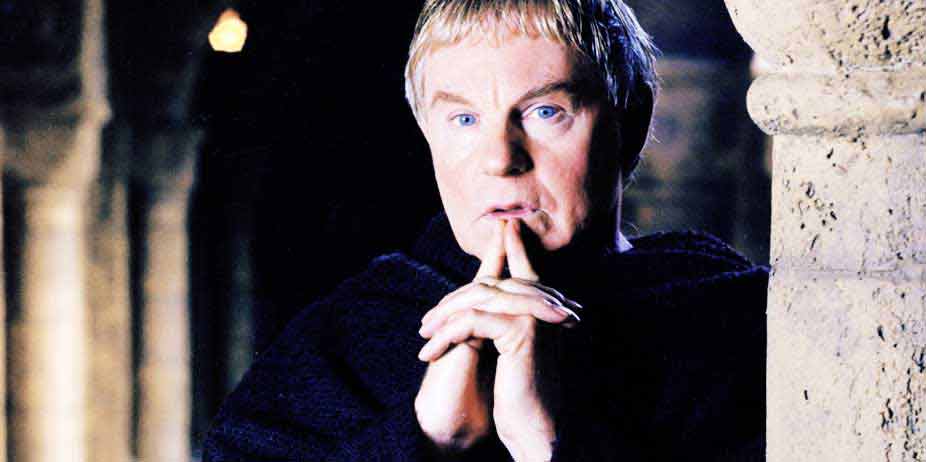Cadfael (1994)
My first introduction to Brother Cadfael was through a friend who informed me I was missing out on a grand adventure by not reading the books by Ellis Peters. I read every single one of them, and then gradated to the BBC series, recruiting friends and family members along the way.
The abbey of Shrewsbury is far from peaceful, and its inhabitants nothing if not memorable, for it is the home of Brother Cadfael (Derek Jacobi), a 15th century herbalist and ex-crusader whose knowledge of medicine and the battlefield makes him an invaluable alley to local law enforcement. England is torn between two rampaging forces, those of King Stephen and the Empress Maude, engaged in a vicious battle for power. But amidst the mightier political forces at work, there are more mundane matters to be attended to, and there is always murder to be contended with. Against the advice of the abbey snitches, Prior Robert and Jerome, and with the permission of the abbot, Radulfus, Cadfael lends his expertise to murder investigations and occasional matchmaking, while contending with faces and memories of the past, the discovery of a long lost son, and struggling to bend to the authority of the church.
Many of the episodes deviate in some form from the original novels and this may upset puritans, but this is wonderfully countered by an excellent cast of recurring and guest characters. Jacobi is magnificent as the slow to anger but excessively human Benedictine, who shows compassion when it is needed but is not afraid to hand out a heavy talking-to either, when one of the parishioners or even his own assistants get out of line. Julian Firth is great as the super irritating and always interfering Brother Jerome, while Terrence Hardiman embodies the strong-willed Abbot Radulfus that I loved so much in the books. There are guest appearances by such actors as Crispen Bonham-Carter, Tara Fitzgerald, Steven Mackintosh, Jonathan Firth, Jonathan Hyde, and Anna Friel.
Each episode is stand alone but build on the common themes of warfare within England and the faces that surround the abbey. Accompanying the series is a good deal of Middle Ages superstition and often peculiar Catholic practices. Cadfael has a surprisingly good grasp of what faith is actually about and is often the voice of reason when it comes to such traditions as honoring saints or arguing theology. There are the occasional "bad" priests (most notably in The Raven in the Foregate) but most of them mean well, although audiences might be surprised to find that many of the monks and even a handful of the nuns have a host of past indiscretions prior to joining the church. Cadfael even has an illegitimate son, the result of a love affair he had in Israel during the Crusades. But only once does he give a piece of advise that I found wanting, when he assures two young lovers that no place is too holy for their intimacy, after they have gone too far behind the alter. Reassurance of forgiveness is one thing; condoning inappropriate behavior is another.
The series is not for very young audiences, as the crimes that are dealt with are often very serious and occasionally mature in nature, but young adults will find them a fascinating glimpse into the past. The political plot lines are not as frequent or heavy as in the novels, which can be tedious for all but the most persistent reader, and Cadfael translates well to the screen. Shrewsbury is certainly a community that I will visit time and time again.
Sexual Content:
St. Peter's Fair displays a nude corpse face-down in several scenes, and also intrudes on a young woman having a bath (nothing is shown). One of the finest episodes of the series also deals with the most horrible crime -- the rape and murder of a young woman. Conversation revolves around it throughout the episode. The Devil's Novice has a sexually promiscuous wife attempting to flirt with anything that moves. The Rose Rent is one of my favorite episodes, but unfortunately includes a servant with wandering hands and a man threatening to and then attempting to rape a woman he has held hostage (they are interrupted). Past adultery is hinted at in Potter's Field. The worst by way of content is The Sanctuary Sparrow, in which we observe a man forcefully bedding his bride (he pushes her out of camera range), and the heavy implications that an unmarried couple have had sex in the church sanctuary. There are mild instances of innuendo and Brother Jerome accuses Cadfael of "lustful" behavior on several occasions.
Language:
Occasional profanities.
Violence:
Characters suffer from blows to the head, knife wounds, fist fights, bludgeoning, and other methods of death, although the most graphic violence is to be found in The Raven in the Foregate, in which the victim is shown hitting his jaw on a dock as he falls through, and spitting out blood. Severed heads also make an appearance in that episode on pikes. A man is violently impaled in Pilgrim of Hate.
Other:
None.

